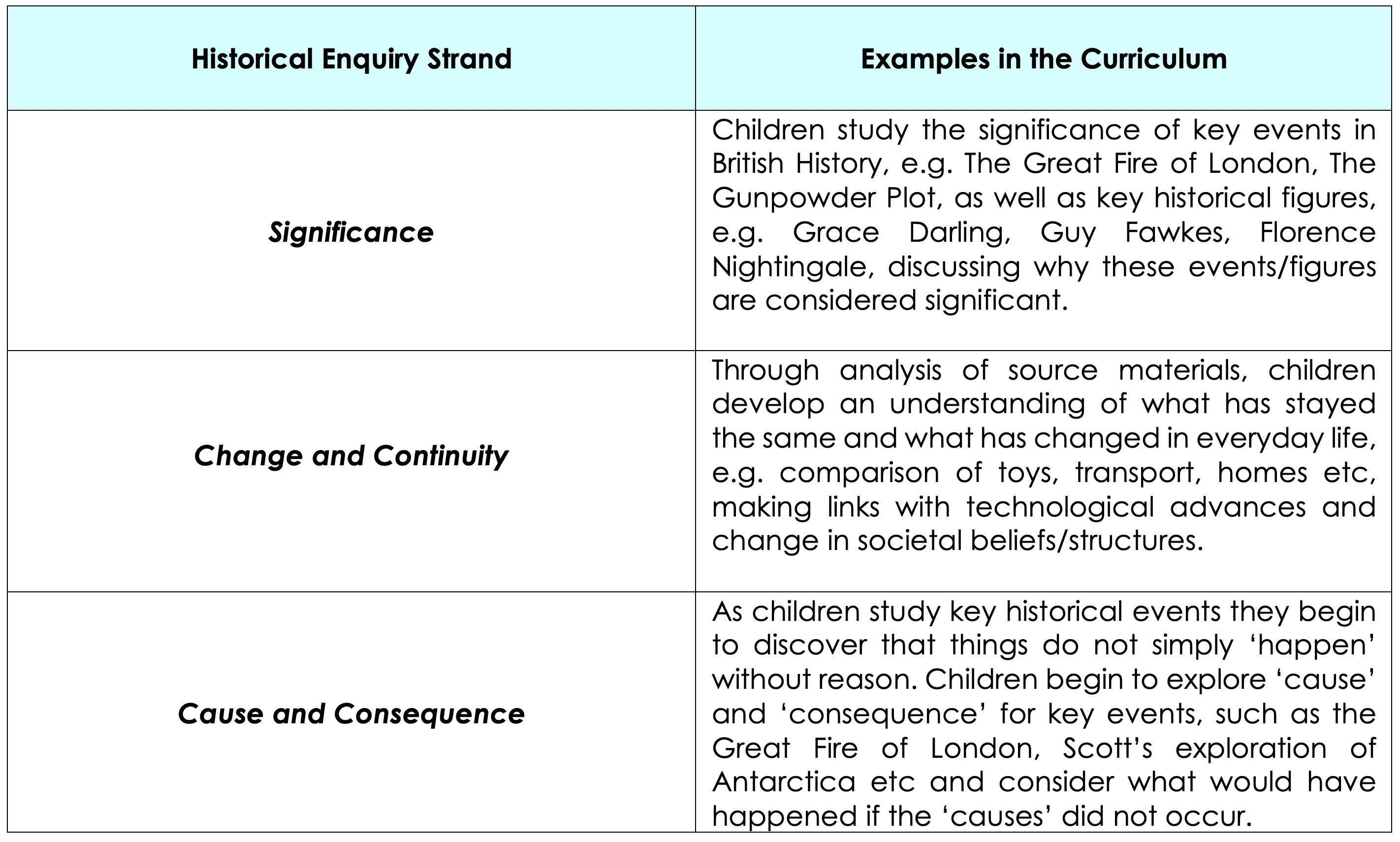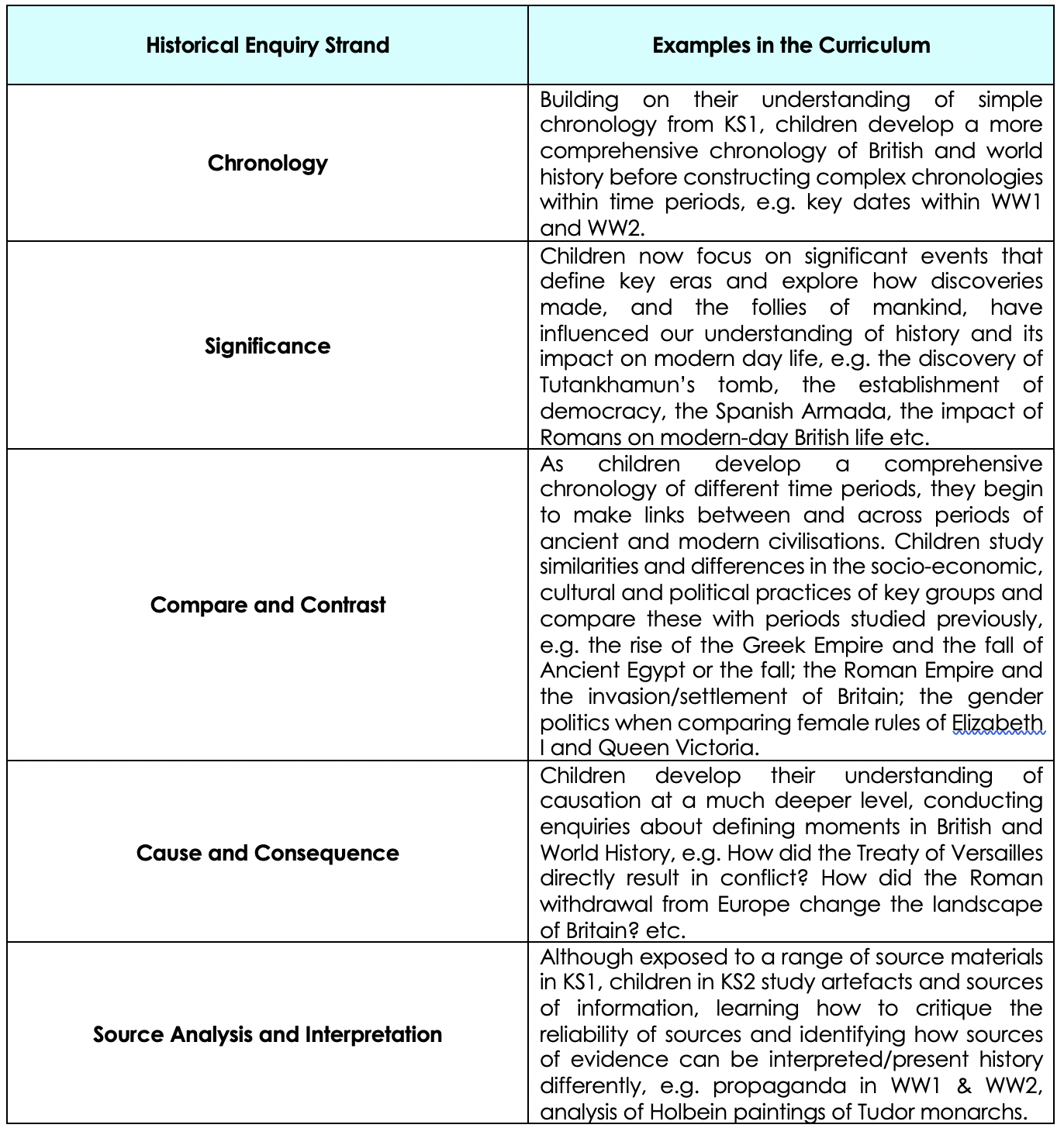History
Through the study of a coherently sequenced curriculum, children at Brookvale will understand that history is a constructed narrative, which can differ from place to place and be contested over time. Leaders and staff have carefully considered the building blocks of progress in history, identifying core knowledge that is essential to pupils’ understanding of new material. Attention and time is given to build up pupils’ knowledge of substantive concepts, such as empires, civilisations, invasions/settlement and chronology as these are considered essential for children to develop a comprehensive historical understanding.
By studying the complexities of historical evidence and differing interpretations, we want our children to interrogate the reliability of information and be rigorous at investigating the validity of claims in history. By empowering our children with the ability to formulate convincing arguments and justify their own opinions based on their investigations, children will be well equipped with the analytical skills of a historian which will give them the ability to thrive in the modern world.
Overall, our history curriculum will enable children to develop their social awareness of how the past continues to shape the future, as well as their moral awareness of the impact their own actions can have on those around them.
History in the Early Years Foundation Stage
The Early Years Foundation Stage (EYFS) Curriculum develops children’s early understanding of History through the planning and teaching of the Early Learning Goal (ELG) ‘Past and Present’ which sits within the area of ‘Understanding the World’. This area of the curriculum encourages children to explore and make sense of past and present events in their own lives, their families’ lives and in the lives of other people they may know or encounter.
A primary focus in EYFS is for children to develop an understanding of changes through time and simple chronology by distinguishing between past, present and future events. Examples of this include:
- Children sharing photographs of themselves and their family members and engaging in discussions about their life since birth, as well as birth to adulthood;
- Sharing stories and artefacts from the past, explaining their similarities and differences;
- By observing routines throughout the school day
- By exploring longer changes through time, such as how plants grow or observing the passing of seasons.
Use of language relating to time is purposefully planned and used in daily routines and conversations with children, for example, ‘yesterday’, ‘old’, ‘past’, ‘now’ and ‘then’ and ‘future’, so that children develop the idea of early sequencing and chronological order.
Embedded within the curriculum is the use of high-quality literature. Teachers regularly share texts, images and tell oral stories that help children begin to develop an understanding of the past and present as well as their ability to ‘compare and contrast’ by discussing common themes in stories. In addition to storytelling, teachers introduce characters, including those from the past, using songs, poems, puppets, role play and other storytelling methods.
History in Key Stage One
In KS1, children continue their exploration of History by immersing themselves in the study and analysis of familiar everyday themes (such as; transport, clothing, toys, communication), enabling them to acquire an understanding of time, events and people in their own, their parents’ and their grandparents’ living memory.
Our curriculum in KS1 has been intentionally designed to be chronologically in reverse. Young children have very little concept of time, so we have devised a curriculum which starts at events in their own personal history and then moves back in decades to their parents’ and grandparents’ histories.
From here, children develop an understanding about the idea of ‘significance’ in history and consider why certain events and people are remembered by engaging in lines of enquiry associated with the idea of: ‘novelty’, ‘applicability’, ‘memory’ and ‘effect’, for example, studies of Florence Nightingale, Grace Darling and the Gunpowder Plot.
As children move from Year 1 to Year 2, they continue to develop the ideas of ‘change and continuity’ and ‘significance’ of events in British history but are also introduced to the idea of ‘cause and consequence’; for example, The Great Fire of London. In these units, children begin to develop a greater understanding of the political and societal factors that were at play during the studied period and how the follies of significant people or events led to long-term and lasting changes in modern society.
History in Key Stage Two
In KS2, the pupils continue to develop a chronologically secure knowledge and understanding of British, local and world history, establishing clear narratives within and across the periods they study. Through their thinking about the ‘cause and consequences’ of past events in Britain and the world today, they devise historically valid questions and construct informed responses, using a variety of sources and their historical interpretation and enquiry of this. Children not only build a long-term chronology of significant periods, but increasingly build chronologies within established chronology, for example, locating the Victoria Era within British History before creating a chronology of key events during this period.
As children move through chronologically planned units, they learn to compare and contrast societal, political and economic factors that led to the rise and fall of ancient civilisations (carefully scrutinising the overlap in each of these periods) as well as learning to scrutinise sources of evidence and how these lead to different interpretations of history.
Historical Enquiry in the Curriculum
Alongside substantive historical knowledge, our curriculum is also underpinned by and develops historical enquiry skills:
In KS1 children develop skills of:

In KS2 children continue to develop and embed skills of:

Our History Curriculum will enable children at Brookvale to:
- Develop a secure and comprehensive chronological narrative for periods of British History, from the Stone Age through to the present day.
- Develop an appreciation of how historic global civilisations have influenced our everyday lives through technological, philosophical, cultural and societal advancements.
- Become increasingly critical and analytical thinkers by engaging in historical enquiry.
- Discover links and connections between different periods of time and civilisations across the globe.
- Further their knowledge and explanations of change and continuity over time with regards to the history of the British Isles and other global societies and eras.
- Differentiate between source types and explain how interpretations in History may differ.
- Draw on similarities and differences within given time frames and across previously taught periods.
- Enquire into Historical themed questions and form their own opinions and interpretation of the past.
The History curriculum is treated as a discipline in its own right, with specific subject knowledge and pedagogical knowledge clearly defined in our school’s comprehensive and sequential planning. This planning ensures children develop a broad and comprehensive knowledge of history that extends beyond the expectations of the national curriculum.
History is delivered weekly across KS1 and KS2, as a discrete subject, and links are made where appropriate, with other areas of the curriculum, for example, through the study of geographical context, art movements or application of reading and writing. Key questions are introduced at the beginning of each lesson for children to explore and staff identify a key historical enquiry skill that is then used as the driver to impart core knowledge.
Tier 2 and tier 3 vocabulary is explicitly taught at the beginning of all lessons and children are encouraged to apply this in their spoken and written work, with teachers continually revisiting this vocabulary to ensure it is retained in long-term memory.
Low-stake short, medium and long-term retrieval tasks are planned into each lesson and teachers use this information to assess learning and progress, adapting teaching sequences according to the needs of their class. Children also complete mid-unit and end of unit assessments for each unit of history studied and the results of these feed into pupil progress discussions each term.
